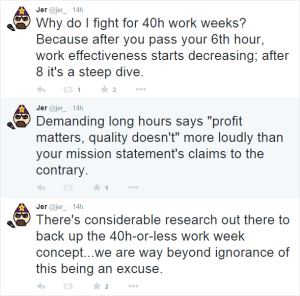Today, I tweeted the following:

It was brought to my attention that the last two tweets in my message were unfair to companies that are trying to do better in many ways, but are trapped by past performance and slow-moving internal politics.
I disagree, and I’ll explain now what I explained then…
Until recently, I did not have a good name for an element of my approach to the world in which I have long taken considerable pride. A friend pointed out that the name for it was “integrity,” in the sense that I reliably adhere to a code and to my values. In short, if I say it, I do it, to the best of my ability (and, of course, the converse is also true). I try to be a “man of his word,” even when doing so causes me significant difficulty.
I think that we spend an awful lot of time at our jobs trying to explain away why our codes don’t apply in one circumstance or another; especially when we’re talking about our corporate values rather than our personal ones. Perhaps profits are down and we’re just trying to get through this one ugly time then we can practice our values again. Sometimes we just don’t have the political clout yet to enforce our values, but given some time, we’ll earn it. Most often, though, it’s just not time yet—but soon, soon it will be time!
I would argue that that is bullshit; a code that you only follow when it isn’t being tested isn’t a code. If I don’t steal because it’s too easy to get caught, my code of conduct isn’t “don’t steal,” it’s “don’t get caught stealing.” Likewise, if my dedication to quality is such that I forsake it when it would make me unprofitable, my value isn’t “deliver maximum quality,” it’s “deliver the best quality you can without hurting profits”—which is really just a long way of saying “deliver good enough.” I value my integrity BECAUSE of how difficult it is to maintain when it’s being tested, and as a customer, I value the integrity of companies that do the same for me.
So when I say “my team won’t work extended hours unless it meets a very particular set of criteria,” I mean PRECISELY that. It is too easy to have your values outshone by every exception and edge case that comes up—and it becomes increasingly easy each time that you do it. In practical terms, this means that I walk a very fine line at times between having my team made no-longer-my-team by virtue of a very abrupt demotion or termination; and I walk that line knowingly because I WILL follow a set of strictures that I know is correct and best for both my team and my business. If I lose my job or my team, I will do so knowing I did the right thing, and I will find an employer whose values are more similar to mine in the future. I have been lucky my nearly 20 year career that this has not actually happened—I suspect that this is at least partially because I actively select companies whose values are in alignment with my own, and I am very quick to leave if I find that no longer to be true.
It is also incumbent upon me, though, to assert my integrity—to honor my code if you will—in a way that makes it easiest for my company to help me follow my values. I spend tremendous amounts of energy in educational efforts in all organizational directions to PROVE the value of these points of view, and I spend even more energy in ensuring that my values benefit both team and company; there’s no point in making a stand that leaves us all the former employees of a former company at the end. Integrity, be it personal or corporate, is profoundly exhausting, challenging, and—as a result—rewarding.
So, do I think it is unfair to say that your actions when things are challenging convey your real values? Absolutely not—in fact, I’d turn the question back to you, if you think that it’s unfair. Is your integrity sufficiently important as to make your actions match your values? And if not, why not?

